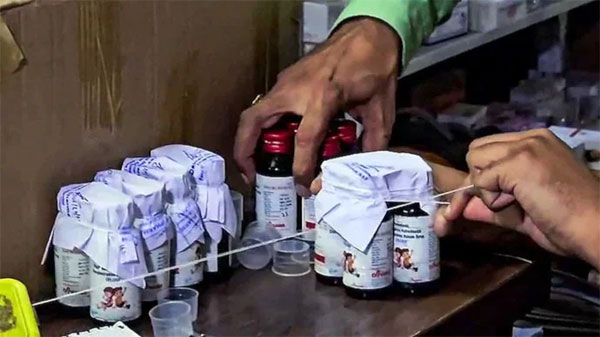Daijiworld Media Network - New Delhi
New Delhi, Oct 9: As the death toll from contaminated cough syrups climbs to 22 children in Madhya Pradesh and Rajasthan, the Central Drugs Standard Control Organisation (CDSCO) has informed the World Health Organisation (WHO) that the three syrups in question were not exported outside India. The products — Coldrif, Respifresh TR, and ReLife — have been linked to fatal cases of acute renal failure and encephalitis among children, prompting global concern.
In response to a WHO inquiry, the CDSCO confirmed that Diethylene Glycol (DEG), a toxic industrial solvent, was detected in these syrups during testing. Coldrif, manufactured by Sresan Pharma in Tamil Nadu, contained an alarmingly high 48.6 per cent of DEG. Respifresh TR from Gujarat-based Rednex Pharmaceuticals tested at 1.342 per cent, and ReLife from Shape Pharma, also in Gujarat, contained 0.616 per cent. DEG is highly toxic when consumed and has been responsible for several mass poisonings worldwide, particularly affecting children.

WHO expressed condolences to the affected families and offered support to Indian authorities in their investigation. It also flagged the risk of such contaminated products entering international markets through informal trade channels. The agency highlighted what it called a serious regulatory gap in India’s oversight of DEG and ethylene glycol levels in domestically sold medications, calling for urgent reforms.
The manufacturing facility responsible for Coldrif in Kanchipuram has been sealed, and several Indian states have taken swift action. Tamil Nadu, Kerala, Madhya Pradesh, Punjab, and Arunachal Pradesh have banned the sale of Coldrif, while Telangana, Karnataka, and Maharashtra have issued public health alerts regarding its use.
Amid the growing crisis, the Director General of Health Services, Dr. Sunita Sharma, has issued a nationwide advisory recommending against the prescription or dispensing of cough and cold syrups for children under the age of two. In cases where such medication is deemed necessary, the advisory insists on close medical supervision and adherence to strict dosage guidelines.
This incident is the latest in a troubling series of similar cases involving Indian-made syrups linked to child fatalities in other countries, including The Gambia, Uzbekistan, and Cameroon. The growing pattern of DEG contamination in pediatric medications has raised urgent questions about oversight and safety in India's pharmaceutical manufacturing sector, particularly among smaller, lesser-known drugmakers.